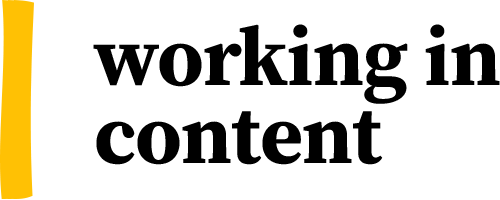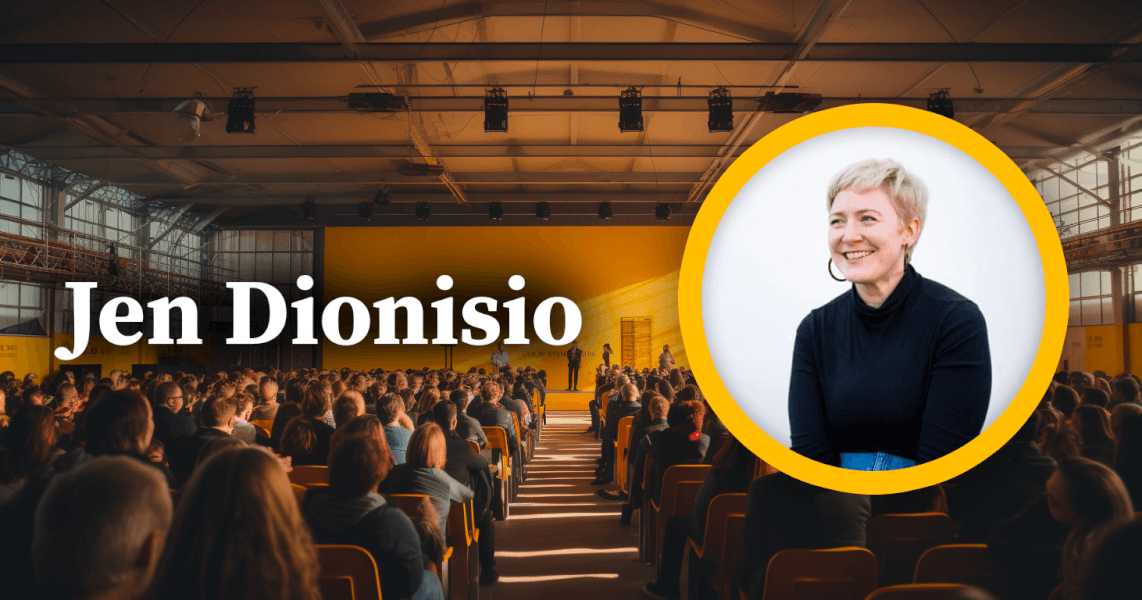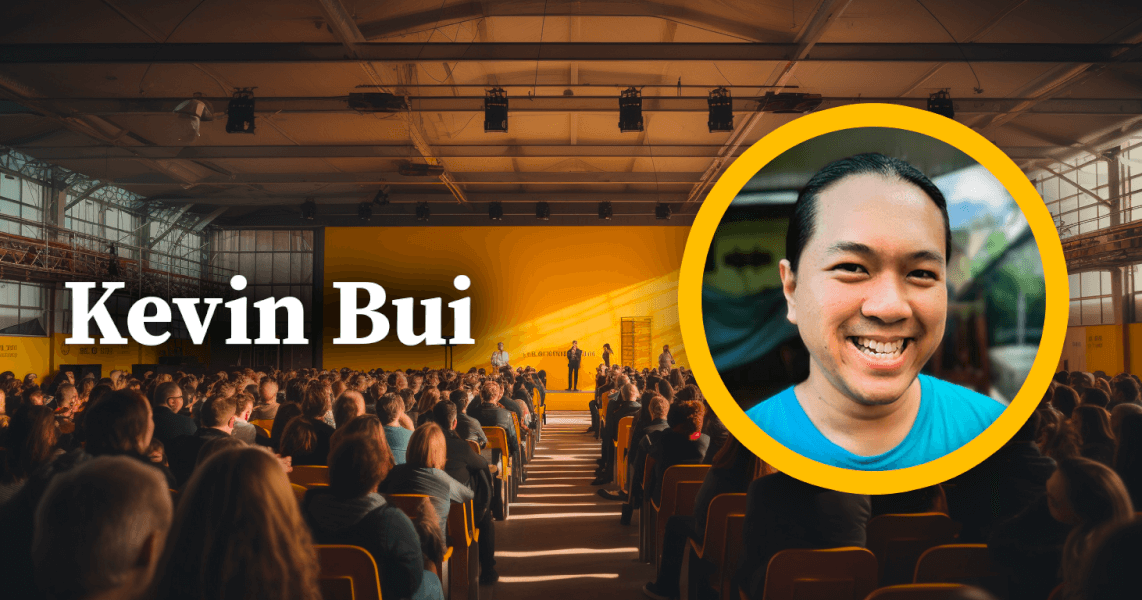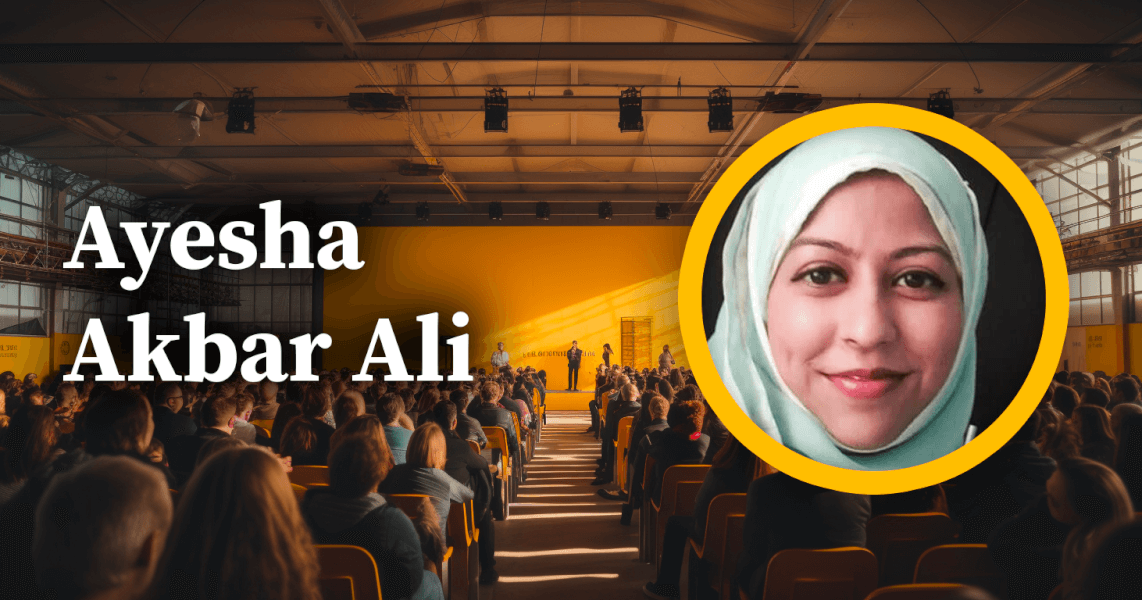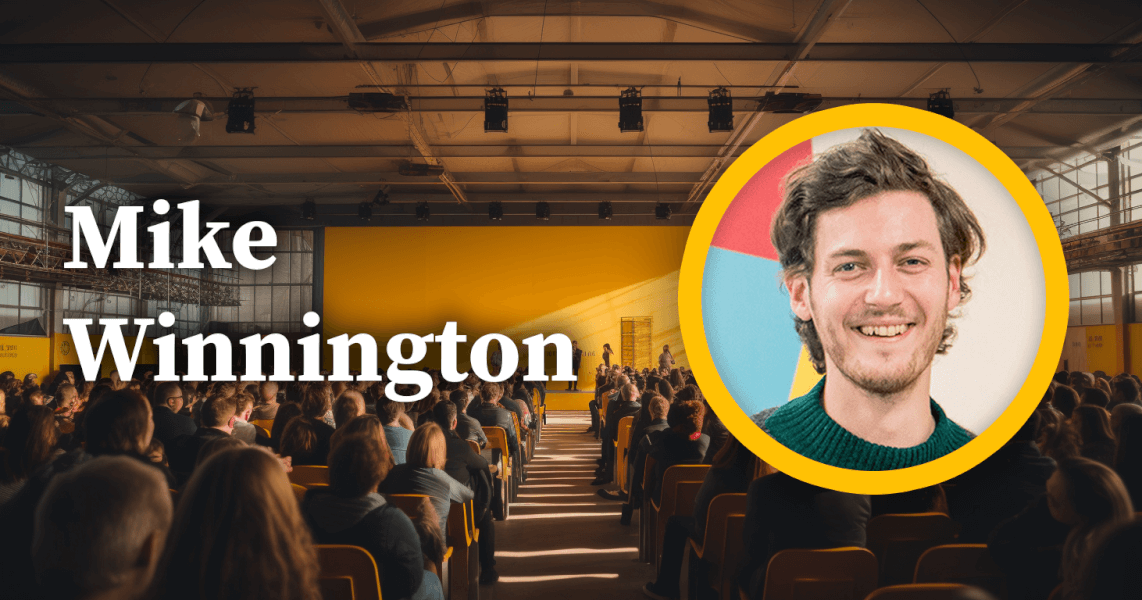On-demand recordings available: Growing In Content 2023
Redesign your career at Growing In Content 2023, whether you're aiming to climb higher in your current role or bouncing back from a career setback.
In the ninth video of our Perspectives series, we feature Katrin Suetterlin, Senior UX Content Architect at Wefox. Katrin takes us on a deep dive into the often-overlooked topic of neurodiversity in the professional environment. She shares her expertise on the importance of inclusive leadership and how it can create a more welcoming space for neurodivergent individuals. The presentation provides valuable insights into creating an inclusive workplace that recognizes and values cognitive differences.
Meet our speaker
Born and raised in the 80s, Katrin Suetterlin has written professionally for almost 20 years. She holds a Master's degree in German and English literature. has a background in language teaching and SEO, PR and online marketing.A soulful and witty public speaker, advocating for inclusion, ethical design and visibility of neurodiversity, Katrin has been featured in the UX community's podcasts, conferences and meetups. Her goal is to bring a different perspective to the discourse while learning from others. Together with two co-founders, she is also holding a monthly meetup for German UX writing. Along with Andrew Astleford, Katrin is executing a different kind of pair-writing in a question and answer format to shed light on a myriad of facets the profession of human-centred UX writing offers.
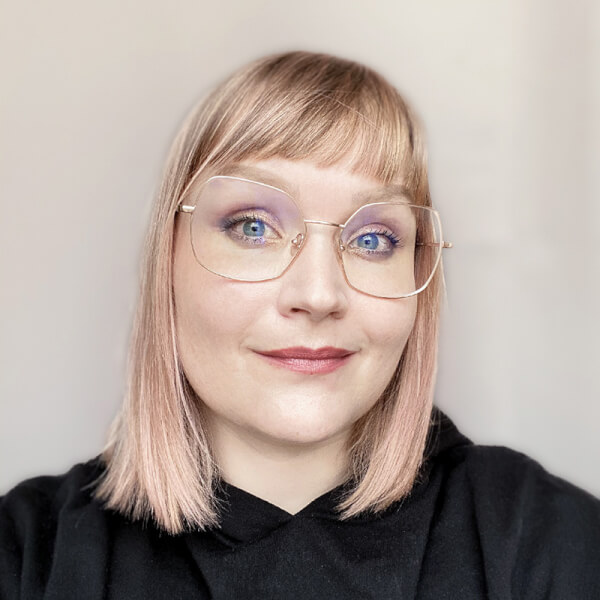
About this talk
In Katrin Suetterlin's talk, the focus is squarely on the intersection of neurodiversity and leadership. She challenges conventional workplace norms by introducing us to the complex landscape of neurodivergent experiences. Katrin doesn't just stop at raising awareness; she delves into the responsibilities of leadership to ensure inclusivity.
Her insights provide a compelling case for why inclusive leadership isn't just an ethical imperative but can also be beneficial for the work environment. From increasing empathy to fostering innovation, Katrin underscores the value of recognizing and accommodating cognitive differences in the workplace.
Other videos in this series
Jen Dionisio shares her journey as a content strategist, her experiences in management and coaching, her personal growth during the pandemic, and offers insights and lessons to help others in their content strategy careers.
Kevin Bui outlines a three-step approach to navigating promotions, focusing on auditing one's skills, reflecting on past projects, and gathering valuable testimonials from colleagues.
Ayesha Akbar Ali shares her journey from copywriting to content design, highlighting the importance of hands-on courses, challenging traditional briefs, and the power of networking and mentorship.
Lessons learned from Katrin
Recognizing Neurodiversity
One of Katrin's key points is the need to recognize and understand neurodiversity in the workplace. She challenges the audience to go beyond mere awareness and to consider the real-world implications of diverse cognitive experiences. This understanding is the first step toward creating an inclusive environment.
The Role of Inclusive Leadership
Katrin emphasizes that leadership plays a pivotal role in fostering inclusivity. She argues that being an inclusive leader isn't just about meeting ethical standards but also brings benefits to the team and organization. She outlines how inclusive leadership can lead to better team dynamics and innovative solutions.
Valuing Cognitive Differences
Katrin stresses the importance of not just accommodating but valuing cognitive differences. By doing so, a company can unlock new perspectives and approaches to problem-solving that might not be apparent in a more homogeneous group.
The Importance of Organizational Culture
Beyond individual leadership, Katrin highlights the role of organizational culture in either supporting or hindering neurodivergent individuals. She offers insights into how a positive culture can make a significant difference in the experiences of neurodivergent employees, impacting not just their well-being but their performance as well.
About Perspectives Conf
This talk is part of Track #4 - Preparing for leadership of the 2022 edition of our conference.
Perspectives Conf is the world’s first event specifically focused on the careers side of content. It’s been carefully curated to help people at all levels navigate the many facets of working in content – from being the first content person to hiring and growing a team.

Transcript of the talk
00:01 Welcome to neuro inclusive leadership at Perspectives, I'm Katrin. And I am happy that you're here and watching this talk. Um, I'm a senior UX content architect at Wefox.
00:18 We do insure tech. but simple. I am a professional writer since 2004 and a UX professional since 2018. I'm also a public speaker activist and host and a cat parent, a plant mom, and a foodie.
00:38 I'm happy to speak at Perspectives and to shed a light on neurodiversity and this talk, will also provide a small intro into the topic in case you never heard of it.
00:50 Neurodiversity, is an umbrella term for many neurodivergencies, that our differences in human brains, I prefer differences to disorders or challenges or anything that should be, um, marking a negative way of thinking of these
01:15 They are not always better or worse than the neuro-typical experience, but since the world is made for the neurotypical people in it, because they are the majority, um, life sometimes can be hard for us.
01:29 Neurodivergent people one in five. So 20%, um, in the general population are neurodivergent, this means the diagnosed or self diagnosed people.
01:42 This is not the under missed or undiagnosed population of neurodivergents. I think this number might be much higher in reality, The neurodivergencies are rarely present on their own.
02:02 I, for myself, I have dyscalculia and also dyspraxia dyspraxia is known as developmental coordination disorder. There's the word again? And it affects movement and quality nations.
02:16 So I will drop the one or the other glass or plate dyscalculia is a different way of perceiving numbers. So it's only fair that a cable rider, not a mathematician
02:33 When we're looking at, neurodiversity, um, it might be easier to think of it as having an different aspects, to approaches in life.
02:48 So it's a different operating system from the rest of the world where other diagnoses like depression and anxiety might be thought of as more aware.
02:57 So I will never be Windows, computer, but I'm expected to interface because I'm outnumbered 50 to one by some estimates.
03:07 And so I'm forced to try to speak Windows in order to function in a world that sees me as a broken version of normal, instead of simply operating differently.
03:17 I thought this quote was very lovely and the other one is lovely as well. Um, in terms of co-morbidities, I usually say diagnoses are like tattoos.
03:27 You can never just get one same. I am also tattooed, so I can speak from experience that this is true.
03:37 And for all the quotes that later follow later, I will not read them out, um, in full. So you can pause once this is available as a recording, and it can save us time.
03:49 So this talk wants to empower you. And I want to give you all the study data you need that is currently out there to understand and challenge, stigma and bias.
04:01 I want to describe how disclosure of your symptoms or, neurodivergencies, can feel or must feel. Um, in case you have not gone through it yourself.
04:13 I want to speak to you about ableism and show you how to do better and as many times in life before success and nice things that I can tell you, hardships lie ahead.
04:27 So let's jump into the hardships. 50% of 1,152 people answering a survey of the Institute of Leadership and Management in 2020 said that they would be uncomfortable hiring a neurodivergent individual.
04:49 Basically 26% would be uncomfortable with hiring someone who has autism or dyscalculia. 90% would be uncomfortable with hiring someone who has dyspraxia and 10% would be uncomfortable with hiring someone who has dyslexia, what an uncomfortable life they lead.
05:06 And basically if you take the first two points off the right column, they apparently would not hire me if I would disclose who I am and how I have to go through life.
05:22 So basically what I thought is that this sounds like xenophobia also, because I found that if only 10% have a problem with a dyslexic people, it might be even if they know what this is that they have, not as much as big of a bias against it, and maybe know people who are dyslexic.
05:46 And so I guess the other ring and the other rising of other people, it's one of the major problems that is happening here.
05:56 In response to that study, they found that the lack of awareness and even fear that can exist around recruiting and managing people with neuro diverse life experiences is baffling and that greater inclusivity for neurodiverse people in the workplace is needed because otherwise they are not able to contribute
06:21 . And if they are missing out on other responses, then there needs to be more education and more integration of people of neurodivergent backgrounds, because they are as capable and as valuable as everyone else, which was also a response to the survey.
06:44 And basically everyone needs to level up the leadership. So in order to get by in what serves us better than a body of research data showing monetary and ethical benefits of your inclusive leaderships.
06:59 So let's check out what I found in the study data for diversity. I made some flashcards and those flash cards saying that in all those very reputable publications, diverse teams take the cake 70% more likely to open up new markets, 90% higher motivation in comparison to all male teams, 12% harder work
07:27 , 90% more likely to stay 57% more effective collaboration, better business decisions, 87% of them. And two times faster in project progress and only one half of the meeting time.
07:43 So diverse teams even perform better, not only as good as non diverse teams and to sum it all up, if you have better project results liners that diverse teams are really performing are really outperforming non diverse teams.
08:11 There is a saying in the disability community that says nothing without us. So how can you achieve this leveling up of leadership and how can you achieve newer inclusion in the workplace?
08:23 And if I say nothing without us, I mean, don't put us on a pedestal and shout you. You're having superpowers because that's not true.
08:31 Every lived experience is different. Assistive technology is everything from phones, to an ergonomic chair to read and write technology on your computer or anything that makes people live the best life at work.
08:52 And if you are leveling up leadership, you can seek out partnerships with a no BS neurodivergent organization. That means beware of, those who claim to solve part in neurodivergent community, but have no neurodivergent staff members only have one token staff member who is not in a leadership role, great
09:14 organizations that I found in my research with, for example, Autistic Self Advocacy Network, Autistic Women, or the Non-Binary Alliance.
09:25 Also, if you work with us, then ask for opinions, views, and challenges on workplace questions and issues, and don't make us your poster child.
09:36 Um, that means like in DEI, don't appoint the one token person to do your inclusion work for you. It's better to hire consultants to help you with that.
09:51 And to also pay them accordingly, because it might be that your team members or your colleagues are already carrying enough load.
10:05 So don't pile up on that. And if you're looking for something along those lines to make us thrive and shine, adjust your work models, time, place flows in any kind of way that fits our schedule.
10:24 And I was trying to come up with something for this talk and thought about nine questions that I sent out to 10 contacts in my neurodivergent community.
10:35 And I got three replies from interviewees and put this into this talk because I've thought hearing from neurodivergent individuals, would really give this the angle, this talk needs because it's not only data, but letting the people speak.
10:55 So when asked, uh, your thoughts on your inclusive hiring, they said, well, more can be done. Um, because as we heard bias, and the other ring is still rampant, um, amongst the workforce and managers and leadership.
11:15 So it's not a surprise that the second person feels internalized ableism. And because they really don't know how to, and there's no support or mentorship for that, how can your diverse teams enrich your workplace?
11:33 And when we see what they are looking for in a leader as an individual, they say empathy, flexibility, and respect, which should be as common as trust and understanding.
11:43 And everyone wants that for their teams. Right? And I love the middle one because it's really is a very neurodivergent thing to say, let me, instead of sending Slack messages and respect, my diversity and how I work differently, what does new divergent leadership mean to you?
12:04 They said unique direction and vision and something less ordinary, simple as that. And again, the visibility factor because representation matters.
12:15 And if your leaders are not neurodivergent, openly, why could you, or should you, what's important for leading neurodivergent people. They answered that.
12:27 They just want the reflection of the differences. That things are not the same for everyone, that they also need the shortcut and the quick and easy to digest action items and not the hour long discussions, and maybe not even knowing how to prioritize and last but not least, if you have someone on your
12:50 team that is really something where you can flourish, because then you're not the other anymore. So next level of leadership, how does it look to sum up offer a flexible work, create space for the people to talk about their experience set one priority and don't ask of people to multitask, which is great
13:16 for every kind of mental health, hire, skill-based and not for social fit. And if your inclusion is not intersectional, it's not inclusive enough.
13:27 This is very important to me because I think this is something that does not yet get stressed enough in research as well, because the intersections are where it's getting very difficult for people.
13:44 So it still is about creating allyship programs. As you have been already doing with other areas of inclusion, where the journey is not over yet work trials, rather than traditional panel interviews, do something in your higher processes and assessments to make it not one size fits all, but custom-made
14:08 and custom tailored for everyone. And speaking of which, how did I get to a next level workplace? Why did I choose three Wefox?
14:17 I went through 25 job ads and three of those rounds were stress interviews, which is a cruel and very un-empathetic way of doing interviews, which basically means they spring on, they spring a task or something like that on you that you have not been able to prepare for.
14:41 And you have been anticipating a different kind of interview. A third of them took a long time to reply and half of them fell to automized with their emails and how they contacted you.
14:55 A third of them had very stressful timelines or just gigantic rounds that have been laid out in block posts or emails or attachments, and maybe it was full of jargon, or it was you don't really like the tone of the place you might be working in on later.
15:18 The empathetic director of design was also amazing because we only did a brief live task look at some screens and we collaborated and we just clicked and we knew this was the right fit.
15:32 And I also got to meet the team panel. They were only asking skill-based questions and it was not so much about social fit.
15:43 And in the end there was one trusting CPO. She knew that she could rely on the opinions of her team and that I would fit the task that was at hand.
15:55 And so I'm thankful for that, they created those safe spaces where you can talk about yourself.
16:01 You, they offer flexible work. Me and my ADHD colleague, we get a four day work week and they hire skill-based and I can even level up myself, um, because they saw something in me that I already knew was there, but others ignored.
16:19 So this is it. That's how I landed a neuro inclusive workplace. And in my capacity as senior, UX content architect, I could also already go out into the world and speak to building inclusive products and how accessibility and inclusion is also affecting neurodiversity.
16:41 And I just have to say a person is more than the diagnosis. Their differences their background wound, and I'm happy to be with a team now and with leadership that knows my value and can see what I can do and who I can be when I can show up as my authentic self.
17:02 So that's it. Thank you, James and Candi. Thank you everyone on the cards for constantly inspiring me and supporting me.
17:11 Don't miss out on, Christina's talk on succeeding in content design with ADHD. Thanks for watching. And thanks for taking an interest for inclusive leadership.
17:23 There are three more slides in silence that you can pause and look at two quotes and my research resources. Thanks again.
17:33 Bye.
Want to know when the next video from Perspectives Conf is published on our website? Sign up for our weekly newsletter in the box below to get notified.
